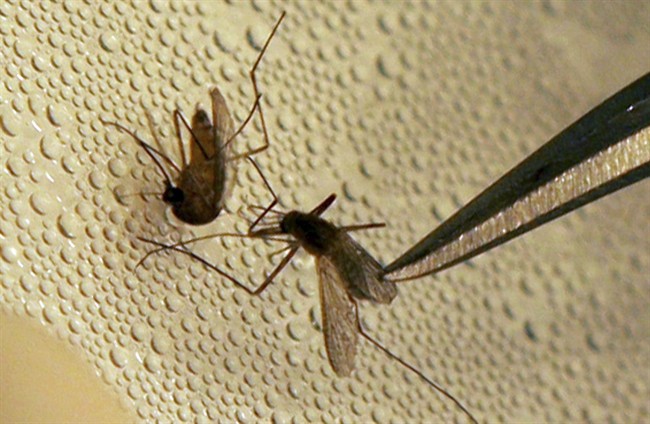TORONTO – When we think about smell playing a role in mating, it may be the idea of a soft, light scent of perfume or cologne attracting us to a man or woman. Usually, we don’t think about sperm and smell if we don’t have to. But maybe we should.

Researchers from Vanderbilt University in Tennessee recently made an unexpected discovery: that the sperm of male mosquitoes — those horrible summer-time pests — uses a sense of smell during reproduction.
The findings were published in the Feb. 3 Proceedings of the National Academy of Sciences.
READ MORE: Prehistoric mosquito with belly full of blood found in Montana (Sorry, no real-life Jurassic Park)
In earlier research on mosquitoes the team, directed by L.J. Zwiebel, the Cornelius Vanderbilt Chair in Biological Sciences, found an unexpectedly high amount of odorant receptors (OR) in males, more than in females. Odorant receptors are a suite of specialized chemical sensors.
These receptors are found on the antennae of mosquitoes. It helps males find females; it females find food, ie. blood.
The researchers wanted to find out why the males had so much more than the females did and decided to examine their testes. What they found was that certain chemicals released onto sperm caused the tail of the sperm to wave rapidly.
“This discovery is really out of the box for us,” Zwiebel. “It is the first time that insect ORs have been found to function in non-sensory cells or tissue.”
The findings present an exciting opportunity to control mosquitoes.
“It is the system, the biological system, that’s responsible for the scourge of malaria in most of sub-Sahara Africa,” Zwiebel told Global News.
“Anopheles gambiae, which the principle focus of our work is probably responsible for a million deaths a year worldwide. So it’s a very significant public health issue. As well as an extremely fascinating biological system.”
The information gathered from this discovery will provide the opportunity for the development of control strategies, he said.
“We’re interested in the basic biology of the mosquito,” said Zwiebel. “Of course, we’re working on the mosquito because there are very important applied aspects…to both reduce the close encounters between mosquitoes and humans and other animals; to remove their role as disease vectors; as veterinary pests; as nuisance insects even. And now with this new direction even to potentially reduce the population size.”
READ MORE: City battles new generation of bite-aggressive mosquitoes
Even though they know that odorant receptors play a role in reproduction, scientists also know that fruit flies or mosquitoes without ORs, are still able to reproduce, likely due to redundant systems that, should the OR be blocked, kick into place. With this knowledge, the Vanderbilt research centres around not blocking the ORs, but rather exciting them so that it becomes a turnoff to the female mosquito. This is called an “excito-repellancy” or “excito-confusion” model.
“It’s the same idea as getting on an elevator with someone who puts on way too much perfume, as opposed to someone you can’t smell at all,” Zwiebel said. “You might be confused and can’t find the person who you can’t smell. But if you’re next to someone who’s got way too much perfume on, that’s a much more repulsive experience.”
So what is the sperm smelling?
Female mosquitoes only mate once in their lifetime. When they do, they store the sperm in something special organs called spermathecae, waiting until they feed to produce eggs. Scientists believe that after they do this, they release a chemical that acts as an odour to the stored sperm, telling it to wake up and make its way towards her eggs (interestingly, the sperm of mosquitoes are longer than the mosquito itself).
The researchers also found similar processes in fruit flies and wasps.
And yes: Human sperm has similar odorant receptors.


Comments